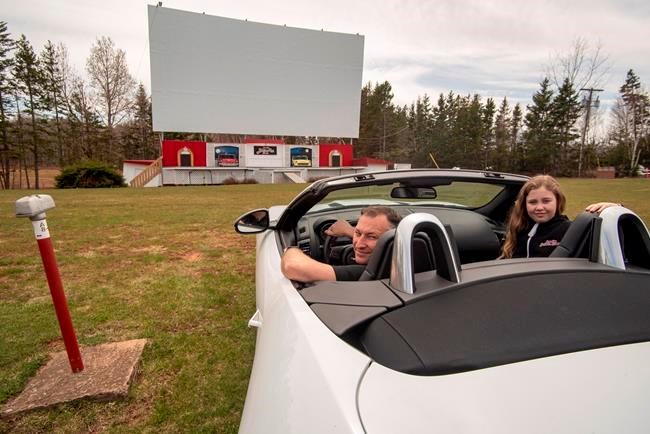TORONTO — Hollywood flicks were always the main attraction at Bob Boyle's drive-in theatre on the outskirts of Brackley, P.E.I., but shortly after the COVID-19 pandemic shut everything down, a nearby high school made an unusual request.
Left without the possibility of their traditional graduation festivities, they wondered if the Brackley Drive-In might consider accommodating families by the carload for a gown-and-hat ceremony under the stars. Boyle was intrigued, and it got him wondering if his towering outdoor screen might become a beacon for other major events witnessed from the physical distance of a motor vehicle.
"I love thinking outside the box," explained Boyle, who's operated the drive-in theatre for 18 years.
"That's where I get my enjoyment — being able to pull off things that people didn't think were possible."
Now Boyle's in discussions with local ministers about having churchgoers pull up their cars for prayer, and he's tentatively booked a couple's wedding, where the cake might be served through the passenger window.
Owning a car wasn't supposed to look this way in 2020. But after years of concern over how the heaps of metal cost way too much to maintain, were the epitome of rush-hour anxiety and spewed carbon emissions, COVID-19 has brought us full circle with the automobile — at least temporarily.
When restless adventurers journey outside the house in the coming weeks, the ones with access to a vehicle will have a set of keys to a multitude of experiences that may elude anyone without their own isolation room on wheels.
Early on in the pandemic, car culture seemed positioned for a renaissance of sorts.
In March, several U.S. strip clubs opened drive-thrus that kept staff working and customers rolling through the doors. Around the same time, footage of a DJ's live set in Germany made the rounds online as he spun techno music while a sea of vehicles packed with ravers honked and flickered their headlights from a safe vantage point.
As summer nears, the trend is catching on. Starting this weekend the Toronto zoo will launch a "drive-thru experience" that sends guests along a pre-planned route where they observe animals safely from their cars. It's a model that will presumably draw smaller crowds, but stave off an outright closure of the premises.
"It feels like 2020 is the year where you make lemonade," said Leah Fay, a member of Canadian band July Talk, which saw its summer tour plans scrapped due to COVID-19 before they embraced playing two shows at a Toronto drive-in theatre this August.
Her band hopes to reignite some lost ticket sales, and promote their new album, while staying physically distanced.
Early illustrations show July Talk performing on a raised stage between two movie screens while dozens of cars looking on, lined up in rows. The screens will have the band's live set projected on them, as concertgoers tune in through their FM radios, just like a drive-in movie.
There's no denying that July Talk's shows won't feel quite the same. Fay can't rush into the audience like she's usually does, and it'll be difficult to read the crowd's energy when it's hidden behind faceless windshields. Still, fellow band member Peter Dreimanis likes the idea of playing to a lot filled with "these little germ-safe pods."
"Even though the car horns will probably substitute (for) handclaps, and there will be some adjustments to make, I think we'll still be able to (have) that kind of tailgate feeling," he added.
Beyond the presentation itself, there are other questions about which events are still worthwhile with crowds packed inside their cars. Many organizers would still like to charge per person, but that's more difficult when people start climbing in the trunk.
Planners of the digital art exhibitiion Immersive van Gogh believe they've met patrons in the middle by starting with a base price for each vehicle, and going up from there.
Corey Ross imagined the temporary cars-only iteration of the exhibit, dubbed Gogh By Car, out of necessity when it became clear the original walk-through version wouldn't be able to operate on the planned launch date. His revised concept runs for the first 11 days, starting on June 18, before he hopes to introduce the original feet-on-the-ground experience when physical distancing rules are eased.
The idea was possible because the digital exhibit was already taking place at the Toronto Star's former printing presses, a facility that welcomed a steady flow of newspaper delivery trucks at its loading dock for years, making it possible for art lovers to drive up in a similar fashion.
Fourteen cars per timeslot will pull into the building, shut off their engines, and watch a 35-minute showcase of moving projections of van Gogh's work onto the walls of the building. They'll be seeing it from the distance of their vehicles, which Ross acknowledges isn't he way it was meant to be experienced, so he's offering ticketholders a return pass once the walk-through exhibit begins later this summer.
"It will be enough to keep us going and allow us to keep everybody working, and in the interim that's what's important," he said.
"Anything that can get us safely out of our home and people re-engaged with culture right now is a sign of hope."
Follow @dfriend on Twitter.
David Friend, The Canadian Press
